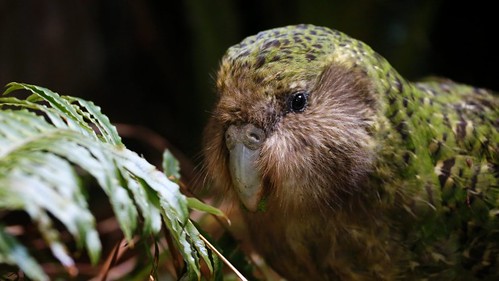 Sirocco the kakapo was the guest of honour at a party on Tuesday night to thank the NZ Aluminium Smelter for its support of the birds' recovery programme. The partnership is set to end in December, with future funding uncertain. Image by CAMERON BURNELLThe future of the Department of Conservation's kakapo recovery programme appears uncertain, with the Tiwai Point aluminium smelter looking at pulling out of its commercial funding after 25 years.
Sirocco the kakapo was the guest of honour at a party on Tuesday night to thank the NZ Aluminium Smelter for its support of the birds' recovery programme. The partnership is set to end in December, with future funding uncertain. Image by CAMERON BURNELLThe future of the Department of Conservation's kakapo recovery programme appears uncertain, with the Tiwai Point aluminium smelter looking at pulling out of its commercial funding after 25 years.
The Southland-based New Zealand Aluminium Smelter has backed the programme since 1990, but the deal is set to end in December.
Conservation Minister Maggie Barry declined to answer questions on Tuesday about whether the department would give extra money to support kakapo recovery once the contract ended.
NZAS funded one-fifth of DOC's annual $1 million budget caring for and breeding the critically endangered flightless parrots, contributing $4.5m and hundreds of volunteer hours since 1990.
Both Barry and DOC said in written statements that they were committed to the recovery programme. DOC was "actively working" with NZAS, as well as other parties, to secure continued funding, both statements said.
Asked why the smelter was pulling out of the deal, NZAS chief executive Gretta Stephens said the matter was under discussion and no formal announcement had been made about whether the contract would be renewed.
Barry, Stephens, DOC director-general Lou Sanson and Sirocco the kakapo were all special guests at an event held at the Zealandia sanctuary in Karori, Wellington, on Tuesday celebrating the smelter's 25-year funding partnership.
Forest & Bird is also part of the recovery programme, which has seen the kakapo population rise from 49 to 125 over the past 25 years. Advocacy manager Kevin Hackwell said the quarter century of the smelter's support was significant in reversing the birds' decline.
But he echoed concerns that DOC would be put in a difficult spot of sacrificing one biodiversity priority for another if Barry did not boost funding levels, in the event of private money falling through.
"We've just recently lost BNZ from kiwi recovery, for example, and they have not been replaced either ... Economies change, but the threat to the species doesn't, and we need to make sure we have the basics covered all the time."
In recent years, the Tiwai Point smelter became more familiar with government generosity, receiving $30m in taxpayer subsidies in 2013.
The company, owned by Rio Tinto, announced its intention to no longer financially support the kakapo partnership back in 2012. Conservation experts at the time said any cuts to funding could have disastrous results for the kakapo's survival.
Labour conservation spokeswoman Ruth Dyson hoped Barry would commit to new government funding to cover the kakapo recovery shortfall, should no partner sign up to offer similar financial support.
"That's always been my concern when previous conservation minister Nick Smith and now Maggie Barry have talked about partnerships ... When the department becomes reliant on private-sector funding to fulfil its core function, it's really problematic.
"We can't make organisations fund particular programmes, we can be attractive, but in the end it's their call what they fund.
"So what's plan B: how are we going to support this amazing and endangered bird going forward?"